Festival time! Spare a thought for the groundsmen, greenkeepers and gardeners who no doubt will be on call during this year’s festive season. While most of us are enjoying the delights of Christmas, a number of our colleagues will be working.
Particularly those groundmen and greenkeepers who must prepare sports pitches for the Christmas season sports calendar. This time of the year brings with it many challenges, especially coping with the weather. Even with all the latest weather forecasting predictions we often do not know what we may be facing in terms of snow, frost and icy conditions.
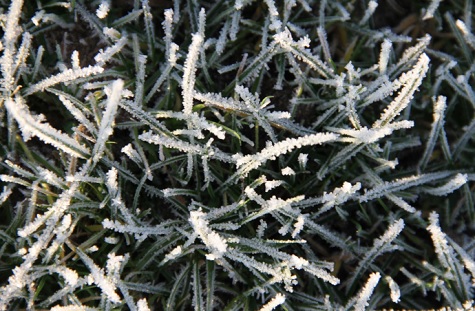
Getting the game on is a skilled operation. Preparation and planning are essential to ensure we can legislate for a window of poor weather. For many of the top-flight or premiership sporting venues, they are now fully prepared with an array of tools and systems to ensure the game goes on.
This comes in a plethora of systems now available such as under soil heating, grow lights, fans, irrigation systems, frost protection covers, sub air systems, inflatable tents and covers to name a few. These systems make the life of a groundsmen much easier than in days gone by.
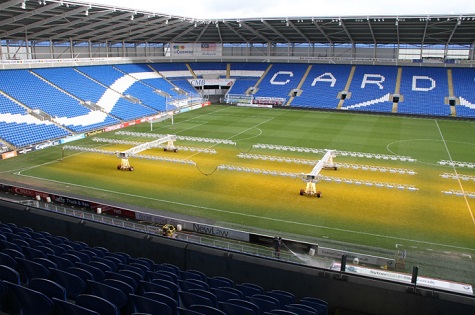
Having said that, there are several issues and time restraints on what can be used to get the game on. The availability of labour and resources will have significant part to play. Also, spare a thought for the clubs who may not have access to, or the money for, these systems, and perhaps have to rely on other means of getting the game on.

For the prevention of frost - until we had the more sophisticated systems such as grow lights, undersoil heating and tents - many groundsmen had to solely rely on the trusted frost sheets to help protect the pitch. Often quite a laborious task in the old days, now we have a number of companies who sell and provide frost sheets that are more easy to handle and store. Stuart Canvas are an example of a company that have been supplying frost sheet covers for many years and have now developed a range of products that suit a range of needs.
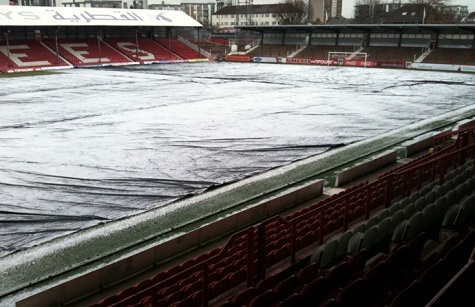
However, despite products such as these being available, we still see a number of games being played on frozen and waterlogged pitches. In my opinion this does not help either the players or the pitch.
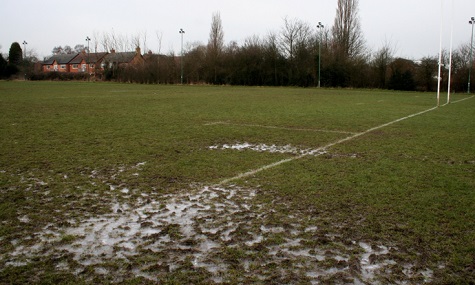
I read with interest a piece on the Stadia Sports website that talks about the issues surrounding whether to cancel or play a football fixture. The site says, “There are no direct tests which one can do to determine whether or not a pitch is safe to play on. It is simply up to the referee.
“This can be easy as when snow or ice is present it is often visible to the naked eye. However, in order for the pitch to be deemed as safe for play, 100% of the pitch must be free from ice. Having small patches of ice, and therefore hard ground, can cause many more trips and falls than previously anticipated. Therefore the referee must fully inspect the pitch before deeming it to be safe or not.
“It is advised that when checking the pitch for frost that they start in the goal mouth, as this is the most used area, and is more likely to be a clear indication of the condition of the rest of the pitch.
“Younger players are much more susceptible to injury and therefore referees of youth games should be even more cautious when making the decision as to whether the pitch is suitable for play or not.
“Though many players are often disappointed when games are either cancelled or postponed due to severe weather conditions, it is paramount to the safety of the players that games are not played when the pitch is deemed unsafe or unsuitable for play.“
Whatever the sport we need to be vigilant during these winter months as to whether the facility is fit for play. This even applies with the advent of the all-weather artificial pitches. They also need inspecting prior to use. Often sold as all-weather pitches, they themselves can be prone to damage from frost, snow and floods.
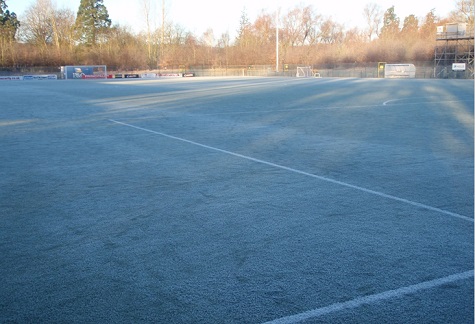
As an ex greenkeeper, one of the important tasks during the winter months is the early morning inspections, when we walk the course and ensure it is fit for play. Declaring a course open is often difficult when you’re dealing with frosty or icy conditions. In recent years we have seen a change in the perception of whether we should or should not play when the course is frozen. Quite often this can be dictated by the member and player who wants to play at all costs.
Many club members expect to be able to play the greens all year round. Once they have booked a game, they expect to play whatever the weather. Many courses do not implement a closed course policy. Or perhaps they just need to keep the course open for financial reasons?
Frost on the grass leaf blades tells us that the water inside the leaves is frozen. Remember that 80+% of plant tissue is made up of water. When this water is frozen, foot traffic on the turf causes the ice crystals in the cells to puncture through the plant's cell walls, thus damaging plant tissue.
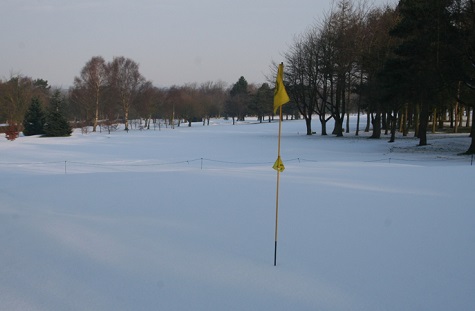
More long-term damage can be caused when play takes place as the turf is thawing after a prolonged freeze. Under these conditions the top surface of the turf may be soft, but the underlying soil can still be frozen. Root damage occurs easily from a shearing action as players’ feet move the soft top surface against the frozen sub soil.
Each time you continue to allow play on frosty greens you continue to promote further turf decline. Low soil and air temperatures also prevent turfgrass recovery.
However, thankfully many golf clubs do operate a favourable frost policy, whereby a number of contingencies are put in place to reduce frost damage on the course and allow golf to be played during frosty conditions. Many clubs are now using artificial winter tee mats, which are brought out for the winter period. Temporary green areas have been mown out and introduced for winter play.
The best policy is for a club to inform club members and players of the reasons why greens and courses may be closed during heavy frosts. Explaining these facts to the members and players will help them understand the longer-term benefits of maintaining the sward quality of their greens.
Therefore, spare a thought for all the groundstaff who dedicate themselves to getting the game on and give them the respect they deserve when having to close the course or cancel a game during inclement weather.